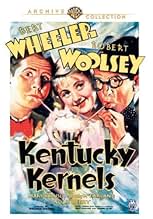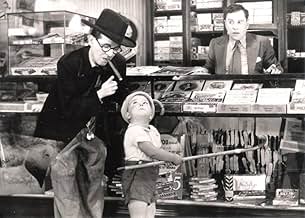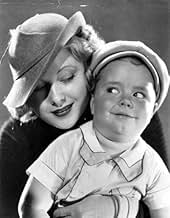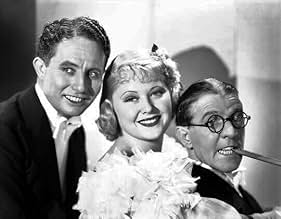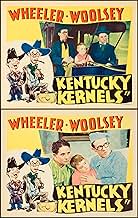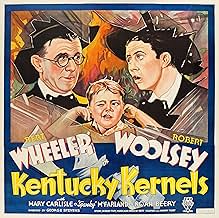Ajouter une intrigue dans votre langueTwo out-of-work magicians help lovelorn Jerry adopt little Spanky. When Jerry makes up and elopes, the duo are stuck with the brat. Then Spanky inherits a fortune, so they all head to Kentuc... Tout lireTwo out-of-work magicians help lovelorn Jerry adopt little Spanky. When Jerry makes up and elopes, the duo are stuck with the brat. Then Spanky inherits a fortune, so they all head to Kentucky and get caught between two feuding clans.Two out-of-work magicians help lovelorn Jerry adopt little Spanky. When Jerry makes up and elopes, the duo are stuck with the brat. Then Spanky inherits a fortune, so they all head to Kentucky and get caught between two feuding clans.
- Réalisation
- Scénario
- Casting principal
George 'Spanky' McFarland
- Spanky Milford
- (as 'Spanky' McFarland)
Lucille La Verne
- Aunt Hannah Milfor
- (as Lucille LaVerne)
Willie Best
- Buckshot
- (as Sleep 'n' Eat)
Harry Bernard
- Destitute Man
- (non crédité)
Edgar Dearing
- Policeman
- (non crédité)
Jack A. Goodrich
- Double
- (non crédité)
William Gould
- One of the Milfords
- (non crédité)
Dorothy Granger
- Ethel - Baxter's Secretary
- (non crédité)
Avis à la une
Any enjoyment you get from KENTUCKY KERNELS will depend on whether or not you can view the film in the context of its time and accept all of the foolishness with that in mind. Otherwise, it's not a particularly rewarding way to view Wheeler and Woolsey. Surely, their reputation was based on better material than this.
The thin plot has the boys adopting SPANKY McFARLAND from an orphanage run by MARGARET DUMONT. He's a cute little bundle but has a penchant for breaking glass at every opportunity--and the script gives him plenty of excuses. Unfortunately, most of the gags are the kind of one-liners that must have killed vaudeville, delivered in brisk style but corny nevertheless.
LUCILLE LaVERNE shows up as an old dowager (she was the voice for The Wicked Queen in Disney's "Snow White"), and MARY CARLISLE is the love interest for one of the boys. The politically correct will be insulted by the WILLIE BEST racial humor in scenes where the boys go south.
Strictly a product of its time, ending in a skirmish between a Hatfield and McCoy type of family feud.
The thin plot has the boys adopting SPANKY McFARLAND from an orphanage run by MARGARET DUMONT. He's a cute little bundle but has a penchant for breaking glass at every opportunity--and the script gives him plenty of excuses. Unfortunately, most of the gags are the kind of one-liners that must have killed vaudeville, delivered in brisk style but corny nevertheless.
LUCILLE LaVERNE shows up as an old dowager (she was the voice for The Wicked Queen in Disney's "Snow White"), and MARY CARLISLE is the love interest for one of the boys. The politically correct will be insulted by the WILLIE BEST racial humor in scenes where the boys go south.
Strictly a product of its time, ending in a skirmish between a Hatfield and McCoy type of family feud.
Always enjoy Wheeler & Woolsey, even if their movie output is uneven; some are very funny, some are not so. I thought this one was pretty funny and that it succeeds due to the professional direction of George Stevens.
It is old-fashioned in that much of the humor consists of what must be old corny vaudeville jokes, sight gags and outrageous puns, all of which might not go over with today's audiences. Speaking for myself I can appreciate such antiquated antics, and I can also put into context outdated racial humor, such as found here in Willie Best's character. He plays his usual slow-talking, pop-eyed servant ("feets, do yo' duty!") by which he became famous.
Spanky McFarland was always a cute little kid and doesn't disappoint here. And this maybe the only time Noah Beery,Sr. sings on screen, and takes a turn along with everybody else singing a Kalmar-Ruby song "One Little Kiss", a very tuneful number written for this picture. Some reviewers take issue with the inane plot, about two feuding Kentucky families, but c'mon, folks. It's just a Wheeler & Woolsey comedy; were you expecting Ingmar Bergman?
It is old-fashioned in that much of the humor consists of what must be old corny vaudeville jokes, sight gags and outrageous puns, all of which might not go over with today's audiences. Speaking for myself I can appreciate such antiquated antics, and I can also put into context outdated racial humor, such as found here in Willie Best's character. He plays his usual slow-talking, pop-eyed servant ("feets, do yo' duty!") by which he became famous.
Spanky McFarland was always a cute little kid and doesn't disappoint here. And this maybe the only time Noah Beery,Sr. sings on screen, and takes a turn along with everybody else singing a Kalmar-Ruby song "One Little Kiss", a very tuneful number written for this picture. Some reviewers take issue with the inane plot, about two feuding Kentucky families, but c'mon, folks. It's just a Wheeler & Woolsey comedy; were you expecting Ingmar Bergman?
Bert Wheeler and Robert Woolsey were one of many comedy teams to make it big during the early sound era. But unlike Laurel and Hardy or the Marx Brothers, their fame has not endured and their movies are not widely available today. Kentucky Kernels is a rare chance to see them at their prime.
The story and screenplay are by Bert Kalmar and Harry Ruby, the same duo who wrote many of the Marx Brothers' early hits, including Animal Crackers and Duck Soup. The fact that Kentucky Kernels features a slightly more conventional brand of humour shows how much of an influence the Marx Brothers had over their appearances. The early Marx Brothers comedies barely had any kind of story at all, because Groucho et al had such wild personalities they overshadowed the logic of plotting. By contrast Wheeler and Woolsey have slightly less exuberant comic personas and are able to work inside someone else's story. This is not a condemnation of the pair, simply an explanation of their difference in style.
Comparisons can be drawn however with other comedians of the era. Robert Woolsey has a little of Groucho in his wisecracking delivery, but also a touch of dour character actor Ned Sparks. Woolsey makes much play of his spectacles and his ever-present cigar, working these props into his aloof, confident comedy creation. Wheeler is more of the straight man, with some of the incompetent and effeminate qualities of Stan Laurel. However he is outwardly normal enough to take the part of a romantic lead in Kentucky Kernels. They are not a bad pairing, although they don't have quite the same dynamic as many of the more famous double acts.
The director for Kentucky Kernels was George Stevens, a graduate from the Hal Roach studios who would later make some very fine pictures. From the rather arty opening shots, it's clear Sevens had a burning desire to be a dramatic director. Stevens, a former cinematographer, had also worked informally as gag-man for Roach and there's no doubt he was a very funny man, but he was never actually that great a comedy director. As he always would, he doesn't stick to wide shots where you can see everything going on, and works a lot in close-up. It's a style that would work very well for him later on, but it doesn't lend itself very well to movies of this sort, as the comedy business becomes too disjointed.
The reason for Wheeler and Woolsey's lack of contemporary fame has been blamed on a number of things, a commonly cited example being their pictures not being reprised on TV in the 50s. However, it seems they weren't exactly phenomenally popular in the first place. Pictures like Kentucky Kernels would do a healthy trade, but they wouldn't get queues round the block. But all comparisons aside, this is still a fairly funny little movie. Our Gang member "Spanky" MacFarland pulls a number of cute and amusing poses. Noah Beery, a hammy version of his brother Wallace, is great fun here. Whether it comes from the writers Ruby and Kalmar, the ideas of cast members or the director, there is a cartoonishness to the humour that keeps things suitably silly. And, even though they may have been a somewhat second-rate pairing, Wheeler and Woolsey are able to provide us with a good many laughs.
The story and screenplay are by Bert Kalmar and Harry Ruby, the same duo who wrote many of the Marx Brothers' early hits, including Animal Crackers and Duck Soup. The fact that Kentucky Kernels features a slightly more conventional brand of humour shows how much of an influence the Marx Brothers had over their appearances. The early Marx Brothers comedies barely had any kind of story at all, because Groucho et al had such wild personalities they overshadowed the logic of plotting. By contrast Wheeler and Woolsey have slightly less exuberant comic personas and are able to work inside someone else's story. This is not a condemnation of the pair, simply an explanation of their difference in style.
Comparisons can be drawn however with other comedians of the era. Robert Woolsey has a little of Groucho in his wisecracking delivery, but also a touch of dour character actor Ned Sparks. Woolsey makes much play of his spectacles and his ever-present cigar, working these props into his aloof, confident comedy creation. Wheeler is more of the straight man, with some of the incompetent and effeminate qualities of Stan Laurel. However he is outwardly normal enough to take the part of a romantic lead in Kentucky Kernels. They are not a bad pairing, although they don't have quite the same dynamic as many of the more famous double acts.
The director for Kentucky Kernels was George Stevens, a graduate from the Hal Roach studios who would later make some very fine pictures. From the rather arty opening shots, it's clear Sevens had a burning desire to be a dramatic director. Stevens, a former cinematographer, had also worked informally as gag-man for Roach and there's no doubt he was a very funny man, but he was never actually that great a comedy director. As he always would, he doesn't stick to wide shots where you can see everything going on, and works a lot in close-up. It's a style that would work very well for him later on, but it doesn't lend itself very well to movies of this sort, as the comedy business becomes too disjointed.
The reason for Wheeler and Woolsey's lack of contemporary fame has been blamed on a number of things, a commonly cited example being their pictures not being reprised on TV in the 50s. However, it seems they weren't exactly phenomenally popular in the first place. Pictures like Kentucky Kernels would do a healthy trade, but they wouldn't get queues round the block. But all comparisons aside, this is still a fairly funny little movie. Our Gang member "Spanky" MacFarland pulls a number of cute and amusing poses. Noah Beery, a hammy version of his brother Wallace, is great fun here. Whether it comes from the writers Ruby and Kalmar, the ideas of cast members or the director, there is a cartoonishness to the humour that keeps things suitably silly. And, even though they may have been a somewhat second-rate pairing, Wheeler and Woolsey are able to provide us with a good many laughs.
Kentucky Kernels is another Wheeler/Woolsey comedy, where they decide to adopt Spanky (the same Spanky McFarland from the "Our Gang" show.) They go down south to visit the Colonel (Noah Beery) and Aunt Hannah ( Lucille LaVerne ) and meet up with the lovely Gloria Wakefield (Mary Carlisle) and the feuding Milfords. The plot is kind of all over the place, but we do get a good dose of Wheeler and Woolsey's standup comedy act along the way. Cast includes Willie Best ( Sleep N Eat ) as Buckshot; Director George Stevens sure did some of the great ones (A Place in the Sun, Diary of Anne Frank, Gunga Din). Some other interesting film connections - Viewers will spot Margaret Dumont (as Mrs. Baxter, head of the Children Welfare League), who made all those movies with the Marx Brothers. Writers Kalmar and Ruby had also written material for the Marx Brothers. Also, Mary Carlisle and Noah Beery's brother Wallace were both in Grand Hotel in 1932. Fun comedy, but pretty wacky and zany. Made at the beginning cusp of the production code in 1934, there are quite a few scenes and jokes that show two men are living together, sleeping in the same bed, keeping house, and adopting a child... pretty far ahead of its time!
A zany Vaudeville magician & his assistant become KENTUCKY KERNELS when they try to return a small boy to his rightful inheritance down in Plantation Country. What they don't realize is that they're walking right into the hottest feud in the Kentucky Hills...
Wheeler & Woolsey are in top form in this funny comedy (Bert Wheeler is the short guy with curly hair; Robert Woolsey is the fellow with the spectacles & cigar.) Although largely forgotten today, they were often hilarious and always fun to watch. This time they are given powerful support from little Spanky McFarland, of the OUR GANG series, one of the greatest of all child stars. Spanky, with his penchant for glass breaking, fits right in with the goofiness that abounds in all W & W films.
What there is of the plot is simply meant to move the gags along, although opening with an attempted suicide is a bit heavy. The romantics this time - between Wheeler & Mary Carlisle - is particularly thin. Others in the cast are basso villain Noah Beery; elderly Lucille La Verne (memorable a few years later as the voice of the Witch Queen in Disney's SNOW WHITE); and always funny Willie Best, here acting under his nickname of Sleep n' Eat. The monumental Margaret Dumont is given little to do in her few scenes; one longs to see her cast as Woolsey's foil.
The Boys - all of them - sing `One Little Kiss'.
Wheeler & Woolsey are in top form in this funny comedy (Bert Wheeler is the short guy with curly hair; Robert Woolsey is the fellow with the spectacles & cigar.) Although largely forgotten today, they were often hilarious and always fun to watch. This time they are given powerful support from little Spanky McFarland, of the OUR GANG series, one of the greatest of all child stars. Spanky, with his penchant for glass breaking, fits right in with the goofiness that abounds in all W & W films.
What there is of the plot is simply meant to move the gags along, although opening with an attempted suicide is a bit heavy. The romantics this time - between Wheeler & Mary Carlisle - is particularly thin. Others in the cast are basso villain Noah Beery; elderly Lucille La Verne (memorable a few years later as the voice of the Witch Queen in Disney's SNOW WHITE); and always funny Willie Best, here acting under his nickname of Sleep n' Eat. The monumental Margaret Dumont is given little to do in her few scenes; one longs to see her cast as Woolsey's foil.
The Boys - all of them - sing `One Little Kiss'.
Le saviez-vous
- Anecdotes"RKO" borrowed George 'Spanky' McFarland from "Hal Roach Studios" for this film.
- ConnexionsFeatured in Hollywood the Golden Years: The RKO Story: Birth of a Titan (1987)
- Bandes originalesOne Little Kiss
(1934) (uncredited)
Written by Bert Kalmar, Harry Ruby
Performed by Bert Wheeler, Noah Beery, George 'Spanky' McFarland,
Robert Woolsey, Mary Carlisle and negro servants
Meilleurs choix
Connectez-vous pour évaluer et suivre la liste de favoris afin de recevoir des recommandations personnalisées
Détails
- Date de sortie
- Pays d’origine
- Langue
- Aussi connu sous le nom de
- Kentucky Corn
- Lieux de tournage
- Société de production
- Voir plus de crédits d'entreprise sur IMDbPro
- Durée
- 1h 15min(75 min)
- Couleur
- Rapport de forme
- 1.37 : 1
Contribuer à cette page
Suggérer une modification ou ajouter du contenu manquant

